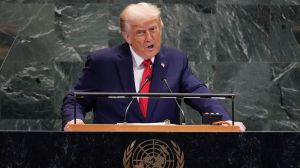Fewer students for pure science worry govt
The Government has woken up to the declining interest in the study of pure sciences and said that its priority will be to find a solution an...

The Government has woken up to the declining interest in the study of pure sciences and said that its priority will be to find a solution and create initiatives in the field. It set up a task force today, to look into ways to improve scientific research in the country.
The Principal Scientific Adviser to the Government, Dr R. Chidambaram today said that India would need many physics-based industries in coming years, so it needs to tap scientific talent. ‘‘The students need to be reassured that if they opt for science they will have a reasonably good career. The most talented in Science must be retained in Science, even though there are better paying jobs,’’ said Chidambaram.
According to the University Grants Commission (UGC), the percentage of students opting for science after Class 12 dropped from 31 per cent in the 1950s to 20 per cent in the 1990s. In the 1950s, the top students from those passing the 10+2 examination opted for science, whereas today, students from the lower middle academic bracket do so. This data was recorded in the report of the Committee constituted by the Scientific Advisory Committee to the Cabinet (SAC-C) of July 2004.
‘‘The basic reason for a decline in enrollments in science courses at the undergraduate level are the attractions to applied and professional courses,’’ the report said. ‘‘Science education at the school level onwards suffers due to lack of reasonable experimental facilities, absence of quality teachers, inadequacies in curricula, lack of flexible subject and course combinations.’’
The task force, which is to be headed by M.M. Sharma, will look at improvements, particularly at the university level. It will make its final recommendations later this week, after taking into account the report and incorporating input from the Indian Physics Association, the Indian Institute of Technology, Delhi, the Nuclear Science Centre, New Delhi, the office of the Principal Scientific Adviser to the Government of India and a one-day seminar on ‘‘Attracting Young People to Careers in Science’’. ‘‘The focus also needs to be on the quality of science education. We need to have good teachers as they will pull in the students and we also need to open more centres of excellence. At present, there are just the seven IITs and two other institutes that are of international repute. We need at least 35 to 40 more,’’ said Dr Amit Roy, director of the Nuclear Science Centre.
IIT Delhi director Professor R.S. Sirohi also expressed the need for a few changes in the current curriculum and JEE entrance exams so that more students who enroll opt for Science. The idea of making science subjects more flexible with other streams is also being considered.
Former HRD minister Murli Manohar Joshi had suggested setting up National Institutes of Science (NISc), patterned on the Indian Institute of Science in Bangalore. That proposal has been shelved since HRD Minister Arjun Singh assumed charge. Interestingly, Minister of State for Science and Technology Kapil Sibal has been demanding that his department be allowed to build the proposed NIScs.
Photos



- 01
- 02
- 03
- 04
- 05




























